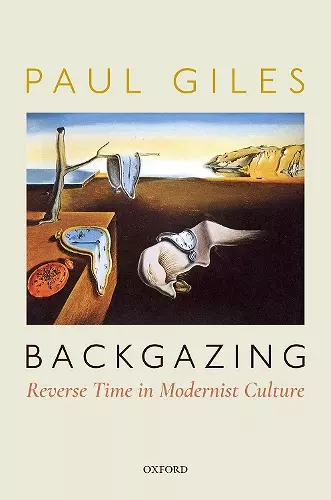Backgazing: Reverse Time in Modernist Culture
Format:Hardback
Publisher:Oxford University Press
Published:4th Mar '19
Currently unavailable, and unfortunately no date known when it will be back

This volume trace ways in which time is represented in reverse forms throughout modernist culture, from the beginning of the twentieth century until the decade after World War II. Though modernism is often associated with revolutionary or futurist directions, this book argues instead that a retrograde dimension is embedded within it. By juxtaposing the literature of Europe and North America with that of Australia and New Zealand, it suggests how this antipodean context serves to defamiliarize and reconceptualize normative modernist understandings of temporal progression. Backgazing thus moves beyond the treatment of a specific geographical periphery as another margin on the expanding field of 'New Modernist Studies'. Instead, it offers a systematic investigation of the transformative effect of retrograde dimensions on our understanding of canonical modernist texts. The title, 'backgazing', is taken from Australian poet Robert G. FitzGerald's 1938 poem 'Essay on Memory', and it epitomizes how the cultural history of modernism can be restructured according to a radically different discursive map. Backgazing intellectually reconfigures US and European modernism within a planetary orbit in which the literature of Australia and the Southern Hemisphere, far from being merely an annexed margin, can be seen substantively to change the directional compass of modernism more generally. By reading canonical modernists such as James Joyce and T. S. Eliot alongside marginalized writers such as Nancy Cunard and others and relatively neglected authors from Australia and New Zealand, this book offers a revisionist cultural history of modernist time, one framed by a recognition of how its measurement is modulated across geographical space.
Backgazing: Reverse Time in Modernist Culture by Paul Giles is an erudite and perceptive account of how the literature of Australia and New Zealand entwine with the key texts and ideas of literary and artistic modernism. Its particular value is how it shows, with satisfying weight, the value of both the antipodes and its literature on the global stage. * Peter Mathews, professor of English in South Korea, Australian Literary Studies *
Backgazing is full of brilliant ideas drawn from Giles's considerable knowledge of early twentieth-century writing across the hemispheres. While few readers will be able to match his breadth of reading, many will find parts of the book illuminating and be persuaded by this new arrangement of twentieth-century world literature and Australian literature's place within it. * Susan Lever, Cambria Australian Literature Series, Inside Story *
Backgazing puts Australia onto the map of global modernism while resurrecting the issue of modernist time for the twenty-first century. It does so with a sweep, an authority, and a scrupulousness of attention that readers have come to expect from the superb work of Paul Giles. * Nicholas Birns, New York University, Modern Language Quarterly *
Two of the bravura readings at the centre of this study are of Thomas Mann and Eleanor Dark. It's worth reading this book for these alone...There are many fascinating points of difference with Dark. There is also a fascinating interlude about H.G. Wells, his entanglements with Australia, and his The Conquest if Time (1942), with a fitting preface about Douglas Sirk's 1937 film To New Shores (Zu neuen Ufern) * Philip Mead, University of Western Australia. , Australian Book Review *
A first dimension of Giles's argument is to add Australian voices (literary voices, of course, but also critical ones) to the discussion of modernism, so that such figures as Joseph Furphy, R. D. FitzGerald, Kenneth Slessor, H. H. Richardson, Eleanor Dark, and James Farrell (among others) enter the analysis alongside much more familiar modernists...Giles is a superb critic, and he brings these works into full literary life, making the case for their interest and value in their own right, and even more in a rich dialogue with modernists who are more widely known. * Modernist Culture *
ISBN: 9780198830443
Dimensions: 242mm x 164mm x 26mm
Weight: 660g
336 pages